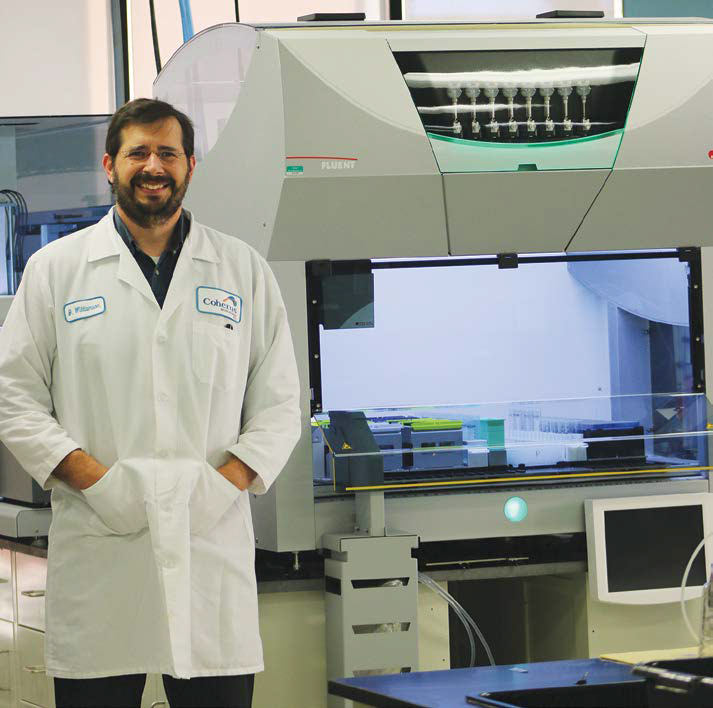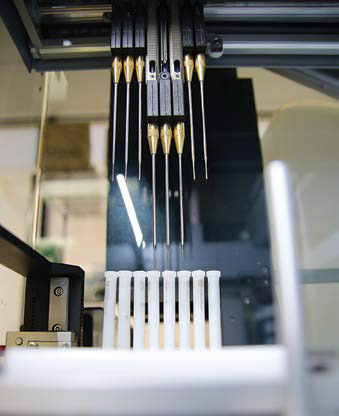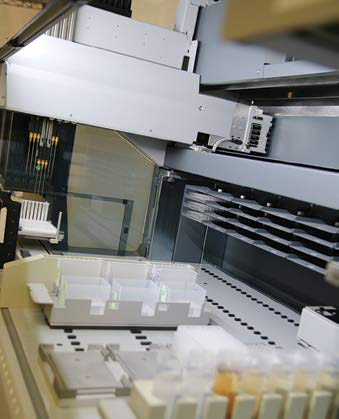Keywords:
Keywords:
Tecan uses cookies to improve our website. By continuing to browse our website, you accept our cookie policy.

Keywords:
The biosimilars market is expanding rapidly as the patents expire for an increasing number of high profile biopharmaceutical agents. The complex nature of biologics requires extensive characterization of the production techniques and in vivo effects of new biosimilars before they can be released onto the market. Coherus Biosciences is using advanced laboratory automation to help screen chromatography conditions as part of its downstream purification processes for new biosimilars.

The importance of biologically-derived therapeutics is of ever growing importance to the pharmaceutical sector, offering more specific and targeted therapies for the treatment of a wide range of conditions and diseases. Unlike generic versions of small molecule drugs, which have chemically identical active ingredients to marketed products, most biologics are heterogeneous preparations composed of multiple protein or antibody subspecies, as well as a variety of other closely associated biomolecules. They are therefore complex to both manufacture and purify, and this presents a major challenge for follow-on manufacturing of generic versions of these medicines – known as biosimilars – once their patents expire.
Coherus Biosciences – based in Redwood City, California – develops, manufactures and markets high quality biosimilar therapeutics with the aim of reducing healthcare costs for treating chronic or life threatening diseases. Founded in 2010 by a group of like-minded industry veterans with extensive experience in the biopharmaceutical industry, the company focuses on inflammatory diseases and cancers, aiming to expand access to biologically-derived medicines.
Downstream processing is an essential element of the biosimilar workflow, ensuring reliable and reproducible manufacture of a product showing the same in vivo effect as the original biologic. Chromatography is commonly used to separate target molecules from the rest of the production cell culture, requiring rigorous screening of chromatography conditions to enable efficient extraction and recovery. Brian Williamson, a senior scientist in Coherus’ downstream laboratory, explained: “In our development program, we screen many different chromatography conditions and media to identify protocols capable of separating out various proteins of interest from all the other cell culture components, such as degraded proteins and product-related contaminants. We built up our laboratory from scratch on a limited budget, but I requested automated equipment to help accelerate the whole downstream development cycle. It’s obviously a commitment on my part, as there’s a signifi cant learning curve with any advanced laboratory equipment, but being able to automate chromatography experiments is very helpful; it allows us to very quickly screen conditions to fi nd a protocol that is suitable for use in a manufacturing environment.”
"Our Tecan systems are enabling us to run new types of experiments that were not previously possible, generating much more data and making it much easier to answer questions and fi nd solutions for our manufacturing environment."
“I was already familiar with the various options on the market, and chose Tecan liquid handling platforms because I had some limited experience of using the company’s instruments in a previous role, and I could see how well they would fi t into our whole development workfl ow. A lot of work has been done in this fi eld with Atoll MediaScout® RoboColumns® – it’s clearly a front runner in the sector – and combining this technology with the Freedom EVO® platform is ideal, allowing us to run eight chromatography separation experiments in parallel. There are other systems on the market that off er a similar approach, but they just don’t have the degree of fi delity that this combination does.”
“We are now running about 16 columns every day, with each cycle of eight experiments taking six to 10 hours. This gives us an eight-fold increase in throughput compared to manual methods, as a researcher could only run two or three columns a day. The samples collected from the MediaScout columns are then either analyzed in our laboratory to fi nd chromatography conditions that can be scaled up for manufacturing purposes, or by our analytical laboratory to support other studies or regulatory fi lings.”
“We have also purchased a Fluent® 480 Laboratory Automation Solution to perform general liquid handling tasks in the lab, as this frees up the Freedom EVO platform for large-scale screening of chromatography conditions,” Brian continued. “The Fluent has an eightchannel Flexible Channel Arm™ with disposable tips, which not only allows us to quickly perform repetitive liquid handling tasks – such as preparing cultures and batching plates – it also gives us the fl exibility to run PhyTip® columns (PhyNexus) for small-scale and lower-fi delity separations. This technology is ideally suited to sample preparation applications, off ering rapid clean-up of eight samples in parallel for our analytical laboratory.”
“Our Tecan systems are enabling us to run new types of experiments that were not previously possible, generating much more data and making it much easier to answer questions and fi nd solutions that are appropriate to implement in a manufacturing environment. Both systems, each with a diff erent focus, are great time savers and really benefi t our workfl ow; the Freedom EVO/RoboColumns combination is clearly the way to go for large-scale chromatography condition screening, and the Fluent off ers more advanced automation, with higher precision and reproducibility. The support we receive from Tecan is also fantastic; we always get a quick reply to any questions we have, which is a really good way to resolve issues that come up,” Brian concluded.

The Freedom EVO allows complete automation of the Atoll MediaScout RoboColumns workflow

Up to eight chromatography experiments can be run in parallel
To learn more about Tecan’s bioprocessing solutions, visit www.tecan.com/bioprocessing
For more information on Coherus Biosciences, go to www.coherus.com
Keywords: